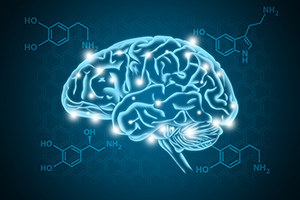When it comes to mood and memory, it’s all about the neurotransmitters—those vital chemicals that brain cells use to convey information. Learn about the critical role nutrition plays in supporting optimal neurotransmitter function in this informative article from our friends at Protocol for Life Balance.
—Dr. Hoffman
This article contains content from one of our trusted sponsors.
Brain health relies on a complex network of cells and interconnected systems involving many neurotransmitters that act as messengers between these cells. Assuming it has access to the proper building blocks necessary for neurotransmitter production, the brain is typically very good at maintaining the right balance of different neurotransmitters to maintain healthy brain functions. And, it is now well established, that a proper balance of specific neurotransmitters such as dopamine and serotonin, will contribute to mental health, including the support of healthy mood and emotions.
Serotonin, also known as 5-hydroxytryptamine, and dopamine are two neurotransmitters that are naturally produced in the brain. A cascade of biochemical reactions is needed to make serotonin from essential amino acid tryptophan. One of these reactions results in the production of 5-hydroxytryptophan (5-HTP), an amino acid indispensable for the ultimate endogenous production of serotonin. Dopamine is produced in the brain via this cascade of biochemical reactions using tyrosine as initial building block.
In the central nervous system, serotonin is known to participate in many brain functions, including the regulation of sleep, mood, emotions, appetite, pain, and body temperature. Serotonin levels in the brain depend on levels of L-tryptophan and 5-HTP in the central nervous system. 5-HTP is known to easily cross the blood-brain barrier, which is the natural brain-protecting gate against xenobiotics.ł L-tryptophan, on the other hand, has only a limited access to the brain due to the need for a transport system shared with other competing amino acids to go from the bloodstream to the central nervous system.
Supplementing the diet with 5-HTP and tryptophan contributes to maintaining healthy brain levels of serotonin, allowing the brain to have serotonin available to support healthy mood and other serotonin-related functions.* Clinical studies have demonstrated that supplementing the diet with 5-HTP and tryptophan can influence brain chemistry and contribute to the maintenance of healthy mood, emotions, and normal sleep patterns.*(1,2,3,4) Because 5-HTP and tryptophan reach the brain in different manners, it may offer more choice and flexibility for individuals seeking to supplement their diet with these compounds to strengthen their brain serotonin levels, consulting a trained professional to determine the best supplementation protocol is a good way to achieve best results.
Dopamine is another neurotransmitter essential to brain health. A dopamine imbalance in the brain can express itself in many ways, depending on where and when the imbalance occurs in the brain. The dopaminergic system in the brain is very complex, involving different families of dopamine receptors that trigger various cellular functions in different regions of the brain where these cells are located and the type of receptors that are activated by dopamine release. The brain also possesses a very sophisticated system regulating the amount of dopamine that is released and metabolized in different regions of the brain. This complex, fine-tuned dopaminergic system is involved in many brain functions including those regulating mood, emotions, and learning abilities, as well as the regulation of prolactin production by the pineal gland, regulation of movement, and many other central and peripheral bodily functions. The importance and complexity of the dopaminergic system in the brain make it essential to have proper stores of tyrosine and L-dopa, which are both important building blocks for endogenous dopamine production.
To this day, there are no published clinical studies examining the effect of dietary supplementation with L-dopa from Mucuna spp. on healthy individuals. Most studies have been done with individuals having known brain dopamine imbalance, and in these special circumstances, supplementing the diet with a Mucuna pruriens extract providing L-dopa resulted in positive effects on the clinical manifestations of their dopamine imbalance and L-dopa supplementation was well tolerated.* These results suggest that, in special settings, Mucuna supplementation is able to safely affect the brain dopaminergic system.*(5)
The main goal of supplementing the diet with L-dopa, L-tryptophan, and 5-HTP is to provide the brain with the building blocks it needs to produce dopamine and serotonin.* With adequate amounts of dopamine and serotonin, the brain can self-regulate to ensure the right balance of these neurotransmitters where and when they are needed.* This brain self-regulation system contributes to positive mood and healthy emotional reactions when we are subjected to normal daily stress.*
Protocol For Life Balance®, a brand of high-quality dietary supplements, offers several supplements that can help to encourage brain production of dopamine and serotonin.* These supplements are Mucuna Extract, standardized to a minimum of 15% naturally occurring L-dopa, L-Tryptophan, available as 500 mg vegetable capsules, and 5-HTP from Griffonia simplicifolia.
References:
- Murphy et al. Psychopharmacology. 2006;187(1):121-130.
- Attenburrow et al. Psychopharmacology. 2003;169(1):104-107.
- Aan Het Rot et al. J Psychiatry Neurosci. 2006;31(4):253-62
- Nakazawa et al. Folia Psychiatr Neurol Jpn. 1980;34(2):83-87.
- Cilia et al. Neurology. 2017;89:432–438
ł Xenobiotics are chemical substances found within an organ that are not expected to be present within the organ. It can also be a substance that is present in much higher concentration than expected. The blood-brain barrier is a virtual gate controlling the type of compounds allowed to reach the central nervous system; its role is to protect the brain and to allow it to remain in a consistent and stable environment.








